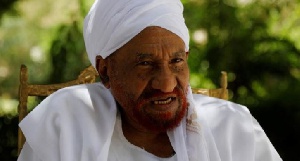 Sadiq al-Mahdi was the only elected leader of Sudan in the last three decades
Sadiq al-Mahdi was the only elected leader of Sudan in the last three decades
The family of Sudanese politician Sadiq al-Mahdi confirmed on Thursday that the 84-year-old leader of the National Umma Party (NUP) died in a hospital in the United Arab Emirates (UAE) following complications from incurring the novel coronavirus.
Al-Mahdi had been flown to the UAE from his native Sudan three weeks ago. His family says al-Mahdi will be buried on Friday.
A statement from his party read: “We offer our condolences to the Sudanese people over his death.” Tributes have come from others in the country including from Sudan’s national news agency which called the departed politician “a unique figure”.
It remains to be seen if al-Mahdi’s daughter Mariam, who is the NUP’s deputy leader, will take over the reins of one of Africa’s oldest existing political parties. That would certainly put her in a league of very few on the African continent and in the Muslim world.
But who was Mariam’s father and why will his contribution to the political development be the subject of many discussions?
A powerful family
Al-Mahdi was born Sadiq as-Siddiq on December 25, 1935, in Omdurman, Sudan to a politician and wealthy religious leader, Al Siddiq Al Mahdi. This family involved a long line of men going back to the 19th century Mahdi leader Muhammad Ahmad bin Abd Allah who led a successful revolt against Ottoman rule in Omdurman.
When al-Mahdi was born, Omdurman was at the time, a part of Anglo-Egypt. But the charisma and statesmanship of al-Mahdi’s grandfather Abd al-Rahman forced the British to acquiesce to allowing the lands to the east of modern Sudan to be part of the larger swath southwest of the Nile, sometime in the 1940s.
The young Al-Mahdi was given the best western and Islamic education as it was clear he was being groomed for the family’s political heritage. He was a graduate of Oxford University, attaining both B.Sc. in Philosophy and Economics and then an M.Sc. in Politics from the distinguished institution.
A torturous political career
In 1964, at the age of 29, al-Mahdi was elected the leader of the NUP. The party had been founded by his grandfather as a moderate congress of Mahdi Muslims with interest in Sudanese nationalism and Islamic democracy.
Two years later, Al-Mahdi was elected Sudan’s seventh prime minister in the 10 years after independence from the British. But his reign lasted for only a year after defections hit the NUP-led coalition and the ensuing instability in government was capitalized upon by Jafaar Nimeiry in a 1967 coup.
The deposed ruler was also to attempt a coup in 1970 but was stopped by Nimeiry. This landed al-Mahdi in prison and then in self-imposed exile, only to return to Sudan in the late 1970s. By 1986, he had been able to put together a coalition comprising of the Democratic Unionist Party (DUP), Sudan’s only other existing pre-independent party, as well as other smaller parties.
He was returned to power in the 1986 election and began to lay the ground for a modern Sudanese society founded on western democratic principles but also staying true to a moderate version of Islam. But in 1989, a young brigadier named Omar al-Bashir seized upon public disaffection and launched a successful coup that toppled al-Mahdi’s second government.
In the last 30 years, al-Mahdi tried as many times as possible to return to power but was curtailed by either the alertness of al-Bashir’s government or in the case of 2010, a presidential election which al-Mahdi lost.
The last three decades of his life were also marked by a number of exiles outside Sudan, as in 2014 when he had to flee to Egypt after he was accused of collaborating with rebels. He returned in 2017 and witnessed the demise of the al-Bashir reign in 2019.
Al-Mahdi, an acclaimed intellectual, wrote several books on subjects such as modernization in Sudan, democracy and human rights in Muslim-majority Sudan as well as on Islamic jurisprudence.